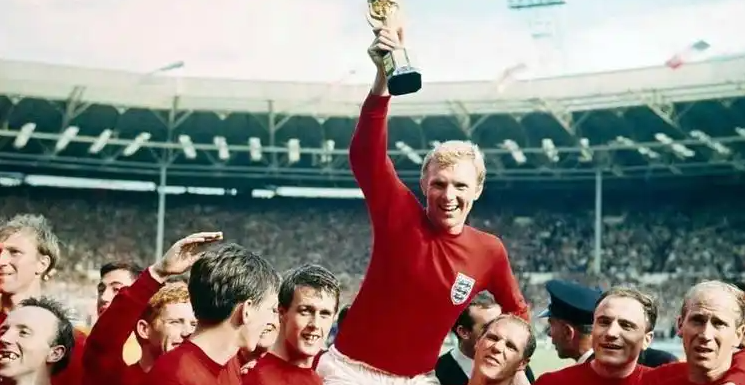
1966: England’s Historic World Cup Victory
On July 30, 1966, England etched their name into football history with a dramatic 4-2 extra-time triumph over West Germany in the FIFA World Cup final at London’s iconic Wembley Stadium. This victory remains the pinnacle of English football, marked by controversy, brilliance, and a moment that divided nations for decades.
The Match That Defined a Nation
The final unfolded under overcast skies with intermittent showers , mirroring the tension on the pitch. West Germany struck first through Helmut Haller’s low finish after a defensive error, but Geoff Hurst equalized with a header just seven minutes later. England took the lead in the second half through Martin Peters, only for Wolfgang Weber to level the score in the 89th minute, forcing extra time.
It was there that Geoff Hurst became a legend. His 101st-minute strike—a thunderous volley off the crossbar—landed on the goal line and bounced out. Soviet linesman Tofiq Bahramov, positioned at the corner flag, signaled the goal counted, sparking bedlam. The decision, later dubbed the "ghost goal", remains one of football’s most debated moments. Modern analyses using virtual reality and 3D modeling have contradicted each other: Oxford University’s 1996 study claimed the ball was 6 cm short of the line, while Sky Sports’ 2016 simulation declared it fully over . Regardless, Hurst sealed his hat-trick with a late tap-in, securing England’s only World Cup title.
Tactical Innovation and Legacy
Manager Alf Ramsey’s 4-4-2 diamond formation—a radical shift from the traditional 4-2-4—revolutionized positional play. By deploying Bobby Charlton as an attacking midfielder and Nobby Stiles as a tenacious defensive anchor, Ramsey created a balanced unit capable of dominating possession and counterattacks. This system influenced generations of coaches, including Sir Alex Ferguson and Pep Guardiola.
The victory also united a war-torn nation. Post-WWII Britain, still rebuilding, embraced the team’s underdog spirit. Captain Bobby Moore, a symbol of grace and leadership, became a national icon, while the Jules Rimet Trophy toured the country, reigniting passion for the sport. The tournament’s cultural impact was immense: the World Cup Willie mascot and "football’s coming home" anthem (later adopted for Euro 96) emerged from this era.
The German Perspective
West Germany, led by Uwe Seeler and a young Franz Beckenbauer (then 21), viewed the defeat as a "stolen victory". Their players claimed the ball had not fully crossed the line, pointing to the white chalk residue on its surface . Yet, the rivalry forged that day became a cornerstone of football’s rich tapestry, with rematches in the 1970 World Cup and 1990 semi-finals further fueling the narrative.

1930: Founding Father of Barcelona Passes Away
The death of Joan Gamper (born Hans Gamper) on July 30, 1930, marked the end of an era for FC Barcelona. A Swiss visionary, Gamper laid the foundation for one of football’s most iconic clubs, blending sporting excellence with cultural identity.
From Zurich to Catalonia
Born in Winterthur, Switzerland, Gamper moved to Barcelona in 1899 to pursue business opportunities. His love for football led him to place an ad in a local newspaper: "Wanted: Football players for a new club". On November 29, 1899, FC Barcelona was founded with 11 members, including English and Swiss expatriates. Gamper served as president five times, financing the club’s first stadium, Camp de la Indústria, and introducing innovative training methods.
A Club Built on Ideals
Gamper’s vision transcended sport. He championed Catalan identity, refusing to adopt Spanish naming conventions (the club’s original name was Foot-Ball Club Barcelona). His philosophy—"Més que un Club" (More than a Club)—embedded social responsibility into the club’s DNA, making it a symbol of resistance during Spain’s Franco dictatorship.
Under Gamper’s leadership, Barcelona won 14 Catalan Championships and 5 Spanish Cups by 1930. He also organized the first Gamper Trophy in 1909, a precursor to today’s annual pre-season tournament named in his honor.
Legacy and Tragedy
Gamper’s life ended in tragedy. Struggling with financial losses and personal demons, he took his own life at 52. However, his legacy endured. The Joan Gamper Trophy, established in 1966, now features top clubs like Real Madrid and Bayern Munich, while his ideals shape Barcelona’s youth academy, La Masia, and its commitment to tiki-taka football.
In 2023, Barcelona’s 16-year-old prodigy Lamine Yamal dazzled in the Gamper Trophy, scoring a hat-trick against Tottenham—a fitting tribute to Gamper’s belief in nurturing local talent . The club’s anthem, "Cant del Barça", still echoes his vision: "You are the pride, the hope of all Catalonia".




